Common Questions From Primary Care Providers About MASH With Allison Moser
Chat with MASLD AI

Hi, I am MASLD AI.
Suggested Questions :

MASLD AI 12:24 PM

In this quick and practical episode, Allison Moser, a hepatology nurse practitioner at Rush University Medical Center in Chicago, answers three of the most common patient questions about metabolic dysfunction–associated steatohepatitis (MASH). She explains how MASH differs from MASLD (fatty liver disease without damage), why it develops in people who don’t drink alcohol, and how it can be reversed with lifestyle changes and new FDA-approved therapies. Allison highlights the link between MASH and metabolic syndrome conditions such as type 2 diabetes, obesity, high cholesterol, and hypertension, underscoring the importance of early identification and treatment. She also discusses the effectiveness of weight loss, dietary approaches like the Mediterranean diet, physical activity, and emerging pharmacologic therapies including resmetirom and semaglutide for patients with stage 2–3 fibrosis. Designed to keep the message simple and patient-centered, this video offers guidance for patients, families, and providers who want to better understand MASH, its risks, and how early action can reverse liver damage and prevent progression to cirrhosis.
Related Podcast
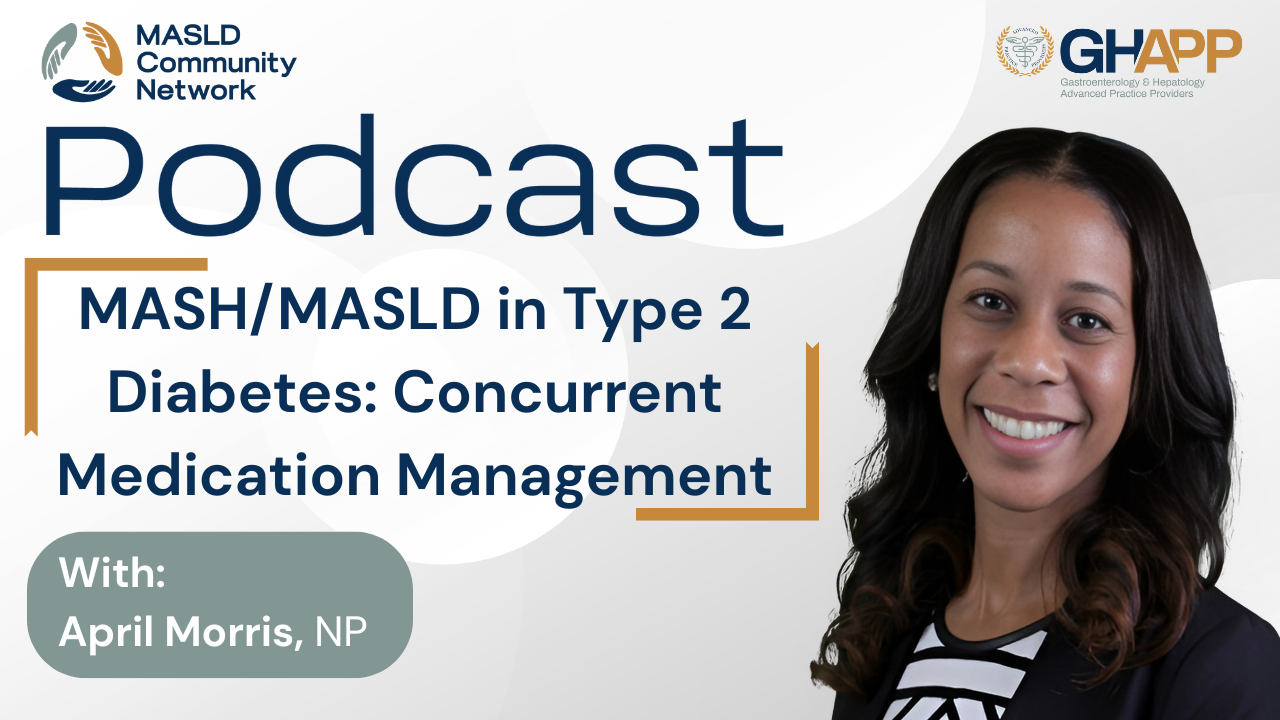
MASH/MASLD in Type 2 Diabetes: Concurrent Medication Management

In this video, April Morris, FNP, shares her expertise on the close connection between type 2 diabetes and fatty liver disease (MASLD/MASH). With over 16 years of experience in hepatology and endocrinology, she explains why patients with type 2 diabetes are at a higher risk of developing MASH due to shared risk factors like insulin resistance and obesity. April highlights how improving glycemic control, lowering A1C, weight loss, and lifestyle modifications can significantly reduce liver fat, inflammation, and fibrosis progression. She discusses the benefits of modern diabetes medications—including GLP-1 receptor agonists such as semaglutide and tirzepatide, SGLT2 inhibitors, and metformin—and how they not only improve blood sugar and weight management but also support liver, kidney, and heart health. Importantly, she notes that most diabetes medications remain safe for patients with liver disease unless advanced decompensated cirrhosis is present, where caution with metformin may be necessary due to lactic acidosis risk. April emphasizes that treating diabetes aggressively and reaching an A1C target around 7% can slow or even prevent progression of liver fibrosis. For APPs and providers, the takeaway is clear: effective diabetes management is one of the most powerful tools to improve liver outcomes.
Watch Now
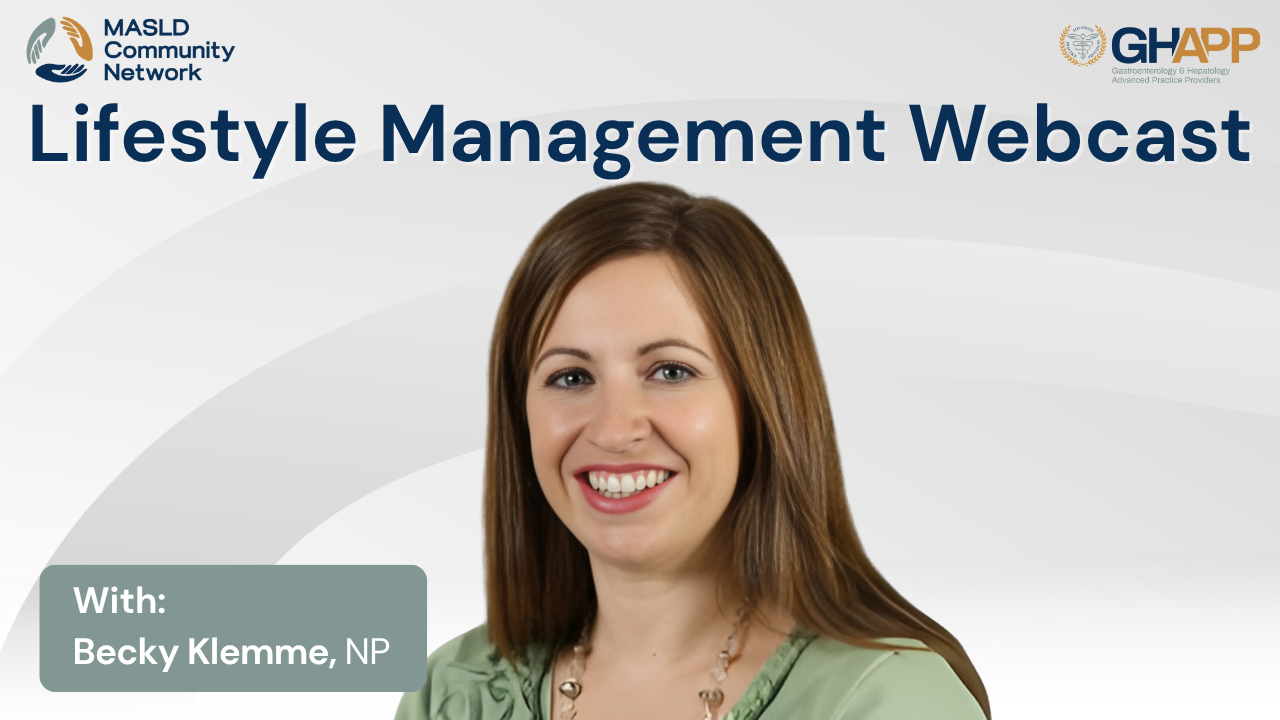
Lifestyle Management With Becky Klemme

In this educational session, Becky Klemme, NP from Sioux Falls, South Dakota, shares over a decade of hepatology experience to highlight lifestyle management for patients with Metabolic Dysfunction–Associated Steatotic Liver Disease (MASLD). Formerly known as NAFLD, MASLD is now the most common chronic liver disease worldwide, closely linked to obesity, type 2 diabetes, hypertension, and cardiovascular disease. Through a detailed patient case, Becky explains how to evaluate MASLD using labs, imaging, and non-invasive tests like FIB-4 and FibroScan, and how to distinguish between simple steatosis, steatohepatitis (MASH), and advanced fibrosis. She outlines practical strategies for dietary changes, exercise, weight loss goals, and metabolic risk reduction—all while keeping patient-centered, culturally sensitive care in mind. Viewers will also learn about the pathogenesis of MASLD and MASH, the role of genetics and lifestyle, and evidence-based approaches such as the Mediterranean diet, structured physical activity, behavioral counseling, and the 5A framework for patient engagement. With obesity and diabetes on the rise, early recognition and proactive lifestyle intervention are essential to preventing progression to cirrhosis, liver failure, or hepatocellular carcinoma (HCC). If you are a hepatology provider, APP, or clinician managing patients with fatty liver disease, this session offers actionable insights and patient care strategies you can use in practice.
Watch Now
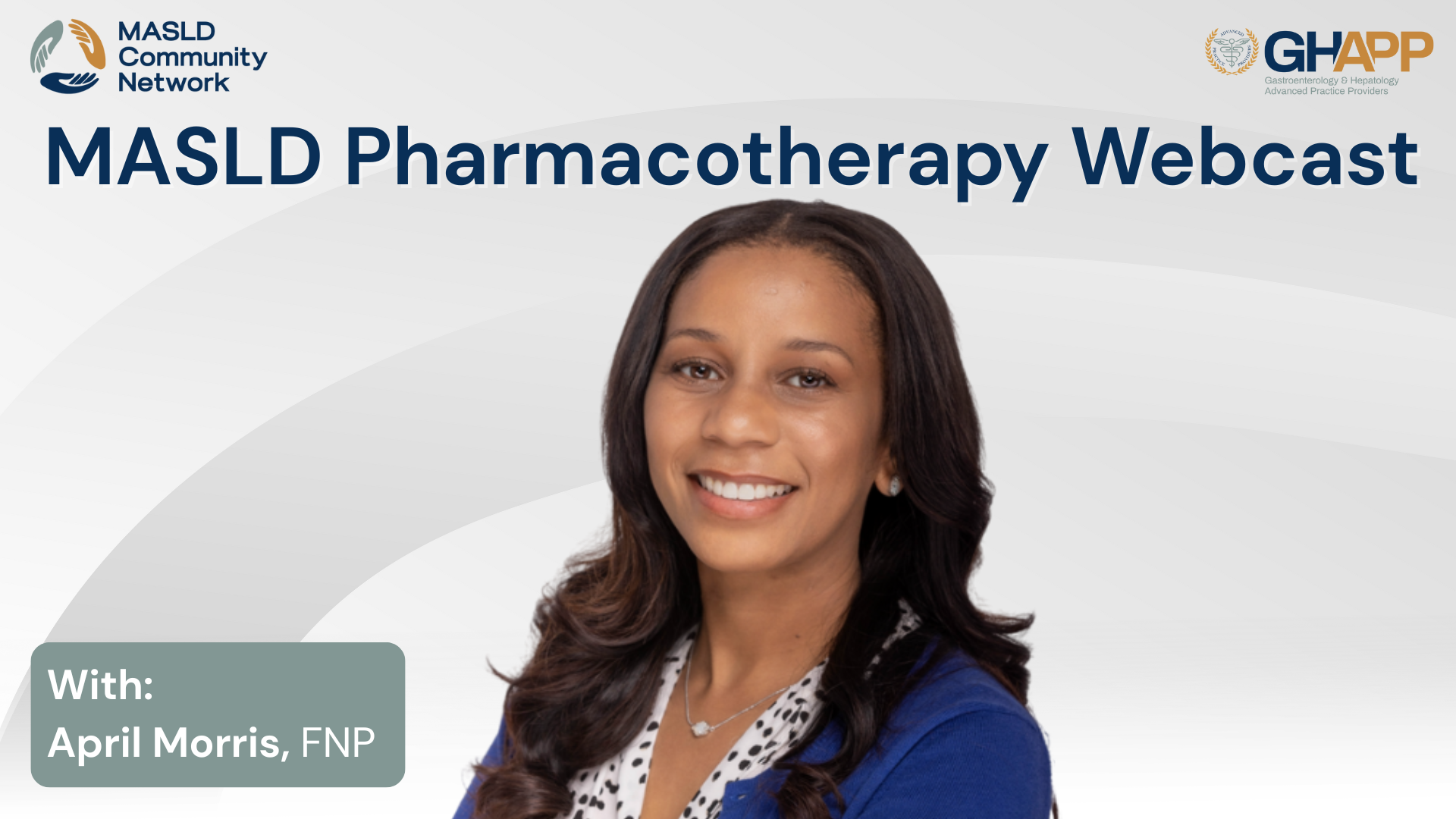
MASLD Pharmacotherapy With April Morris

Join April Morris, FNP, a hepatology and endocrinology nurse practitioner, for a comprehensive review of MASLD pharmacotherapy as part of the GHAPP MASLD Community Network. This expert-led session outlines a three-pronged strategy for managing Metabolic Dysfunction-Associated Steatotic Liver Disease (MASLD) and MASH, focusing on obesity reduction, cardiometabolic risk control, and liver-directed treatment. April walks through first-line lifestyle approaches, highlights key pharmacologic agents like GLP-1 receptor agonists, and explains their mechanisms and clinical relevance—including the groundbreaking data from the semaglutide trials showing resolution of MASH and improvement in liver fibrosis. The session also reviews the role and limitations of vitamin E and pioglitazone, emphasizing their risks in patients with diabetes or cardiovascular disease. The spotlight then shifts to resmetirom (Rezdiffra), a thyroid hormone receptor beta agonist FDA-approved for adults with non-cirrhotic NASH and moderate-to-advanced fibrosis (F2–F3). April explains the MAESTRO-NASH trial endpoints, clinical efficacy, common side effects, and appropriate patient selection. Learn how resmetirom improves fatty acid oxidation, reduces hepatic fat and fibrosis, and the key drug–drug interactions and statin dose considerations to manage during treatment. The discussion concludes with practical tips for monitoring, non-invasive staging (FibroScan, ELF, MRI-PDFF), and the evolving guidance on treatment duration, safety labs, and insurance barriers. This session is essential for clinicians navigating the growing landscape of therapeutic options in MASLD/MASH care.
Watch Now
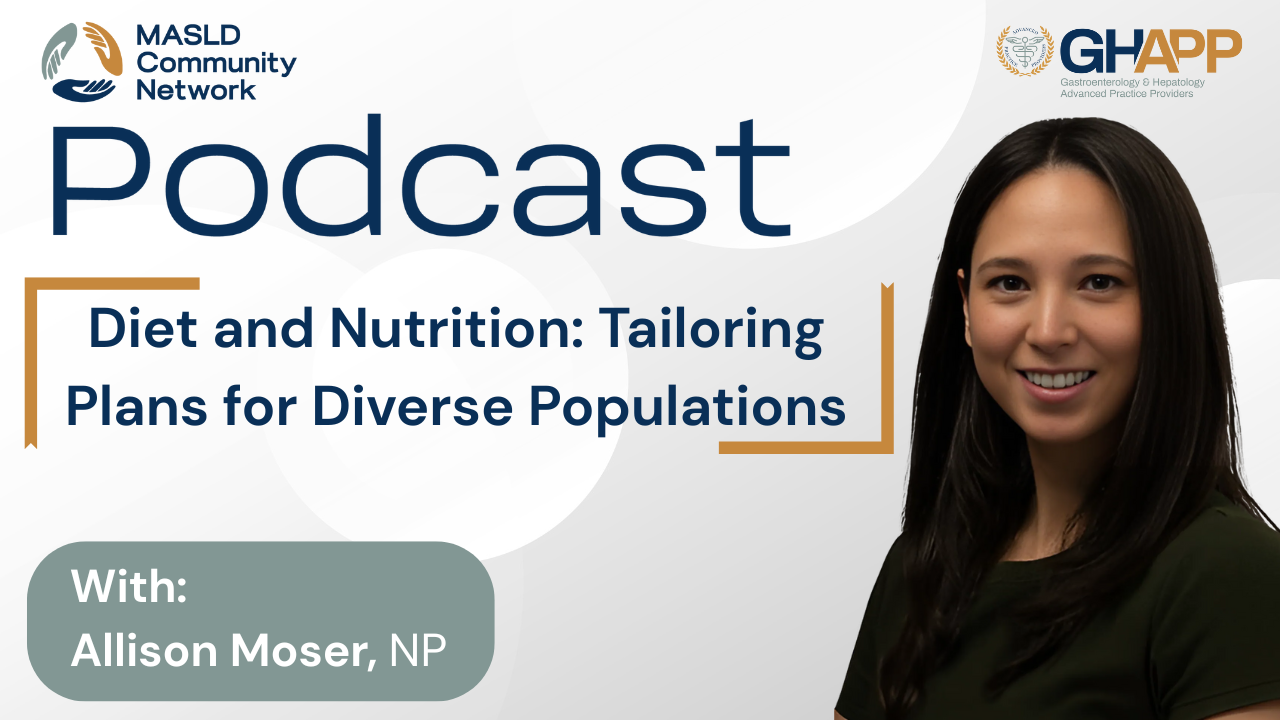
Diet and Nutrition: Tailoring Plans for Diverse Populations

In this episode, Allison Moser, NP, from Rush University Medical Center, dives into one of the most impactful aspects of MASH (Metabolic Dysfunction–Associated Steatohepatitis) management — diet and nutrition. While weight loss is often the starting point, Allison explains why sustainable liver health depends on personalized, culturally sensitive, and practical nutrition strategies. Learn how evidence-based eating patterns like the Mediterranean diet and plant-based diets can reduce hepatic steatosis, improve insulin sensitivity, and lower inflammation, even without weight loss. Allison shares actionable food swaps for diverse cultures, affordable ways to eat healthy when access is limited, and tailored recommendations for patients with comorbidities like diabetes, CKD, and cardiovascular disease. She also discusses the major role of added sugars, processed foods, and sugary or diet beverages in driving liver damage — and how to help patients make realistic, stepwise changes that last. Whether you’re an APP, NP, PA, or clinician treating patients with MASH or MASLD, this episode offers practical, evidence-based tools to improve nutrition counseling, build patient trust, and support long-term liver health.
Watch Now
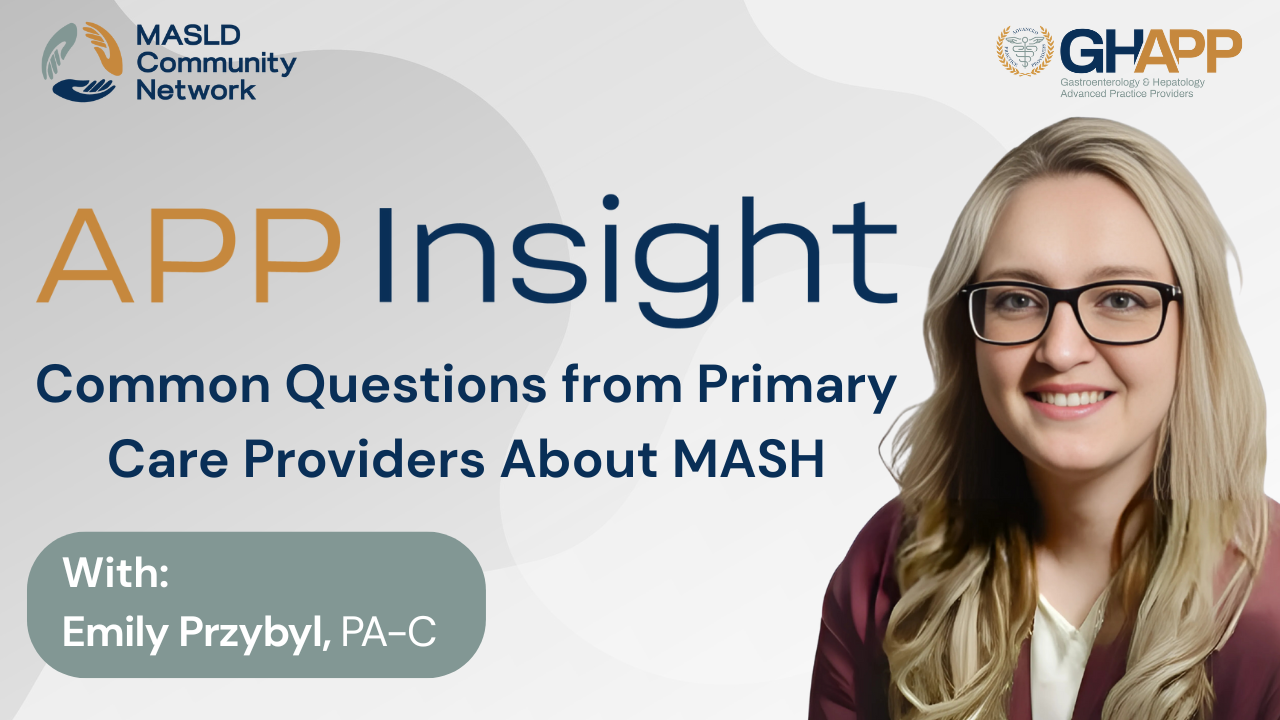
Common Questions from Primary Care Providers About MASH

In this informative episode, Emily Przybyl, PA-C at Erie County Medical Center in Buffalo, NY, answers two of the most common questions primary care providers have about MASLD (Metabolic dysfunction-associated steatotic liver disease) and MASH (Metabolic-associated steatohepatitis): When should I refer to hepatology? and Is it safe to prescribe statins in patients with fatty liver disease? Emily explains that any history of hepatic steatosis on imaging or elevated liver enzymes (LFTs) is reason enough to initiate referral for further workup, including non-invasive testing like FIB-4 or FibroScan®. She also debunks the common myth that statins should be avoided in this population, emphasizing that statins are not contraindicated and are critical for managing cardiometabolic risk factors that drive liver disease progression. This episode is a must-watch for clinicians navigating MASLD/MASH in primary care, with practical guidance that supports early intervention and evidence-based management.
Watch Now

APP Insight: Misconceptions About Liver Health

In this video, Christina Hanson, FNP-C, from South Denver Gastroenterology, dispels common myths around liver health and highlights a critical shift in how we identify and manage fatty liver disease. With the updated terminology from NAFLD/NASH to MASLD/MASH—Metabolic Dysfunction–Associated Steatotic Liver Disease—Christina explains how the new name more accurately reflects the underlying cardiometabolic drivers of the condition, such as obesity, type 2 diabetes, hypertension, and dyslipidemia. She emphasizes that liver enzyme abnormalities or incidental imaging findings should no longer be the only triggers for evaluation. Instead, clinicians—especially in primary care and endocrinology—should proactively screen high-risk patients using non-invasive tools like FIB-4 to assess for liver fibrosis. With over 50% of patients with type 2 diabetes and up to 90% of those with morbid obesity at risk for coexisting fatty liver, early identification and triage are vital to improving outcomes. This is a must-watch for healthcare providers seeking practical, guideline-driven strategies for detecting MASLD and MASH in everyday clinical practice.
Watch Now
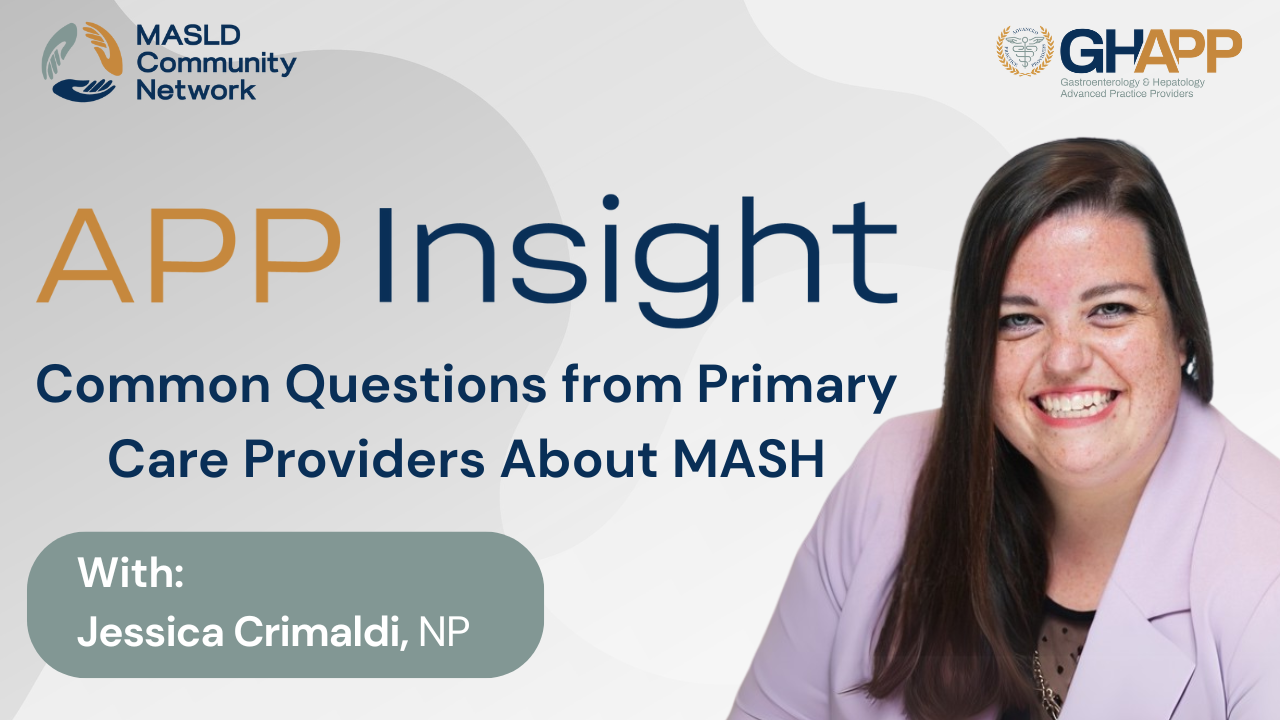
Common Questions From Primary Care Providers About MASH

In this insightful episode, Jessica Crimaldi, NP from the Cleveland Clinic, addresses two of the most frequently asked questions from primary care providers about MASLD (Metabolic dysfunction-associated steatotic liver disease) and MASH (Metabolic-associated steatohepatitis). First, she clarifies a common concern regarding statin use in patients with liver disease, emphasizing that statins are not only safe in most cases—including compensated cirrhosis—but also beneficial in managing cardiometabolic risk factors and slowing disease progression. She explains when statins are contraindicated and encourages collaboration with hepatology if there are concerns. Second, Jessica outlines a practical pre-referral workup for suspected MASLD/MASH patients. She details the labs needed to calculate FIB-4, suggests ordering an INR, and highlights the importance of screening for viral hepatitis, autoimmune liver disease, and common genetic liver disorders. This episode offers clear, actionable guidance for providers managing fatty liver disease in primary care and is a valuable resource for improving early diagnosis and coordinated care.
Watch Now
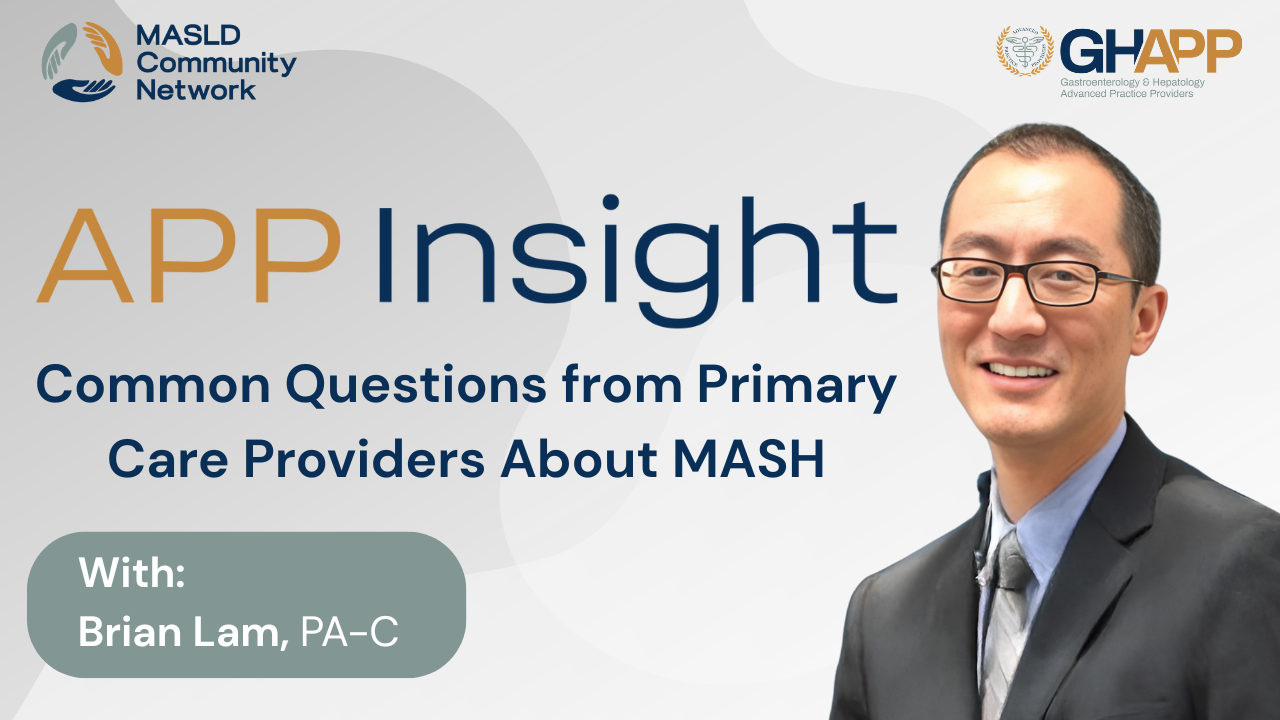
Common Questions from Primary Care Providers About MASH

In this FAQ session, Brian Lam, PA-C, breaks down a common question he receives from primary care providers, endocrinologists, and even other GI specialists: Which patients with fatty liver should be referred to hepatology or GI for further evaluation? Using a clear and practical approach, Brian explains how to apply FIB-4, a simple lab-based non-invasive test, to guide referrals. He emphasizes that patients with metabolic syndrome—especially those with diabetes—are at significantly higher risk for MASH (Metabolic dysfunction-associated steatohepatitis), with roughly 1 in 3 diabetic patients affected. If the FIB-4 is greater than 1.3, or greater than 2.0 in adults over 65, it's time to refer. Brian also highlights the utility of FIB-4 with reflex to ELF, now available through major labs like LabCorp and Quest, as an efficient two-step method to detect advanced fibrosis and at-risk MASH. This video is perfect for busy clinicians looking for a referral-friendly workflow to catch MASH early and improve liver health outcomes in high-risk populations.
Watch Now
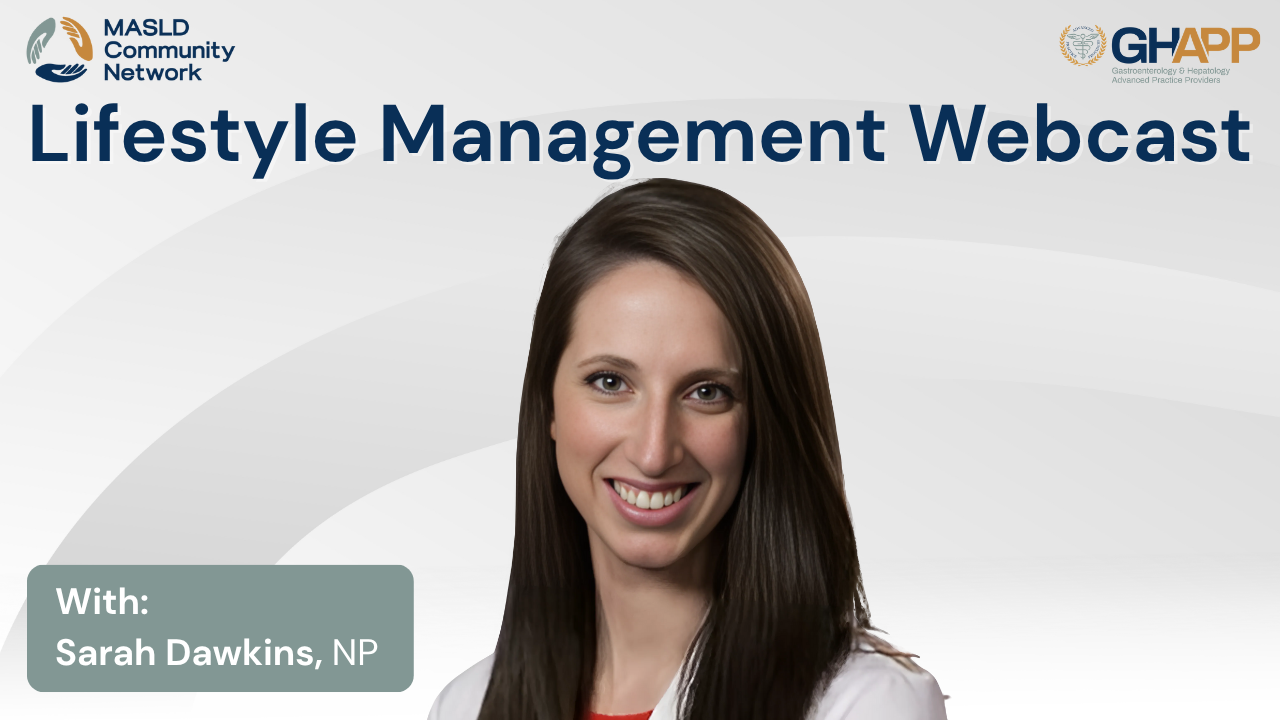
Lifestyle Management With Sarah Dawkins

Join Sarah Dawkins, NP, for an in-depth and inspiring conversation on lifestyle management for MASLD (Metabolic Dysfunction-Associated Steatotic Liver Disease) and MASH (Metabolic Dysfunction-Associated Steatohepatitis), presented through the GHAPP MASLD Community Network and sponsored by Madrigal Pharmaceuticals. In this engaging session, Sarah uses the real-world case of "Albert" to explore how to assess fibrosis risk using non-invasive testing like FIB-4 and FibroScan, and why lifestyle interventions remain the cornerstone of care for patients without advanced fibrosis. Through a patient-centered lens, she outlines practical strategies for addressing dietary counseling, exercise goals, and culturally sensitive approaches to nutrition—highlighting how individualized care, family involvement, and positive reinforcement can create meaningful behavior change. The session dives into the science behind genetic risk factors like PNPLA3, the role of central obesity in inflammation, and the impact of Western diets on liver health. Sarah also reviews the Mediterranean diet, exercise recommendations, and evidence-based interventions, including the benefits of aerobic + resistance training over HIIT for MASLD improvement. With clinical pearls on motivational interviewing, overcoming barriers to access, and the use of tools like the Exercise and Diet Adherence Scale (EDAS), this session empowers providers to make lifestyle conversations impactful—even when time is short.
Watch Now
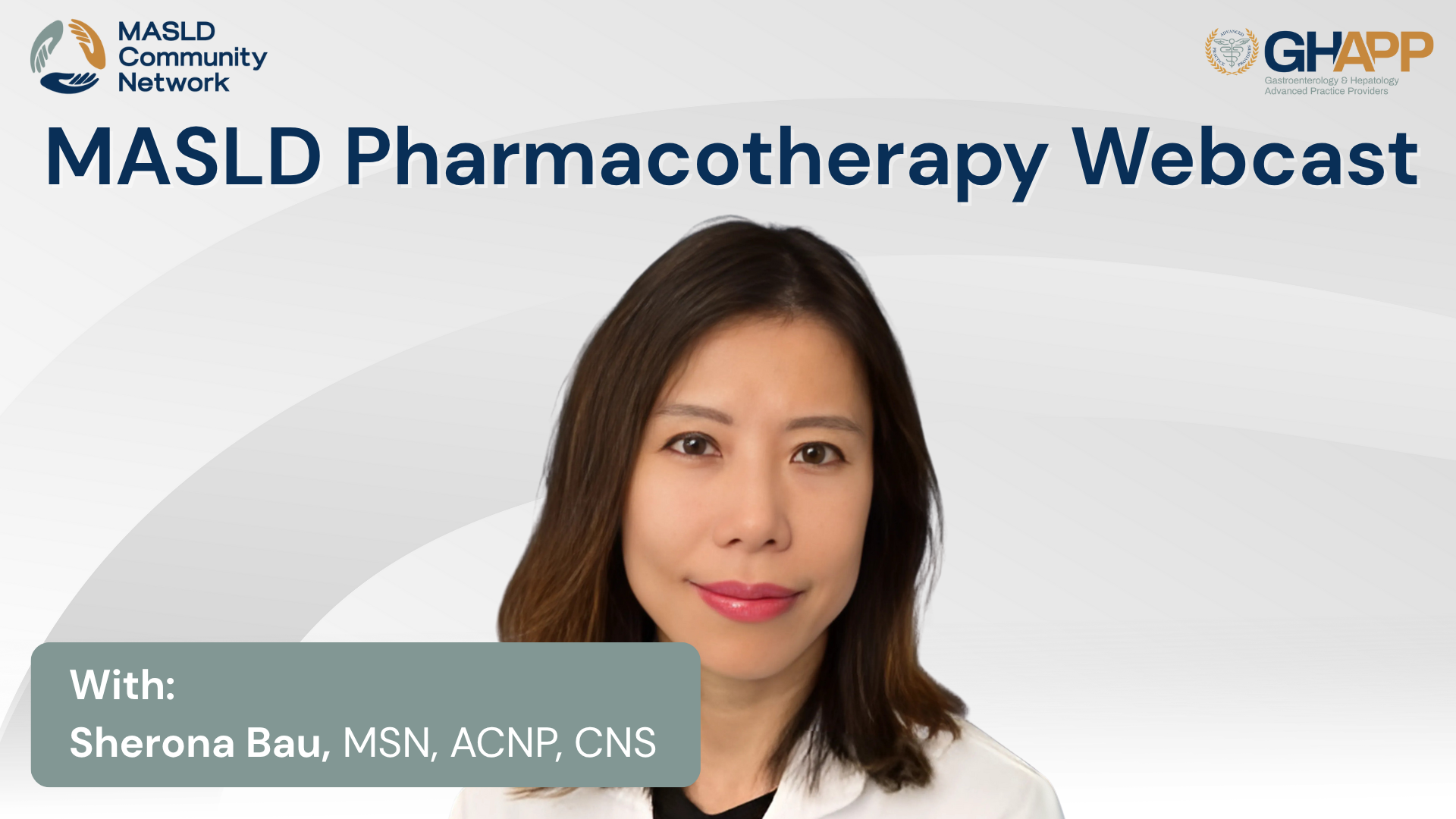
MASLD Pharmacotherapy

In this dynamic and highly informative session, Sherona Bau, NP, presents a comprehensive overview of pharmacotherapy in MASLD and MASH, breaking down current treatment strategies and emerging therapies for patients with metabolic dysfunction-associated steatotic liver disease. This presentation, part of the MASLD/MASH Community Network, begins by contextualizing the recent nomenclature shift from NAFLD/NASH to MASLD/MASH and its clinical implications. Sherona explores lifestyle intervention targets, including Mediterranean diet, weight loss goals based on fibrosis stage, and the role of GLP-1 and GIP receptor agonists in improving liver health. She highlights the ESSENCE trial results for semaglutide, discusses the only FDA-approved therapy to date—resmetirom (Rezdiffra)—and explains its mechanism of action via thyroid hormone receptor beta activation. The session dives deep into efficacy data from the MAESTRO-NASH trial, side effect profiles, drug–drug interactions, and monitoring recommendations. She also previews a pipeline of promising agents in phase 2 and 3 trials—including tirzepatide (GLP-1/GIP), cotadutide (GLP-1/GR), pemvidutide (GLP-1/GIP), and retatrutide (GLP-1/GIP/GR)—offering insight into what’s next in the evolving treatment landscape. This is a must-watch for hepatology and endocrinology clinicians focused on the future of fatty liver management.
Watch Now





 September 2025
September 2025 